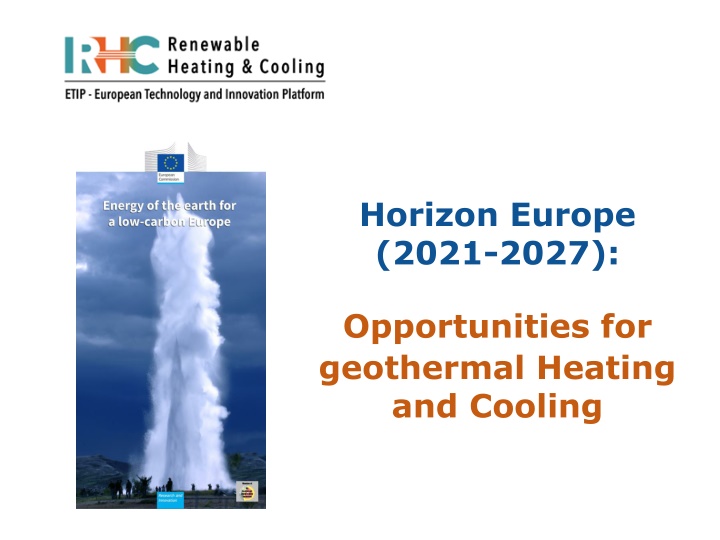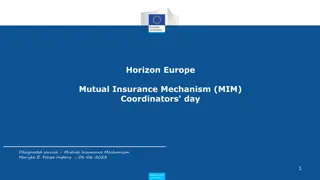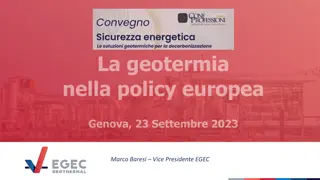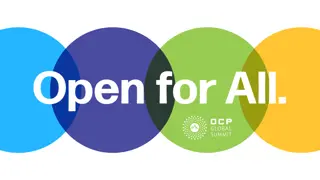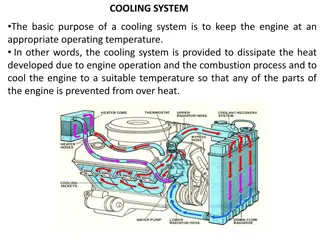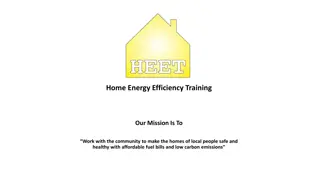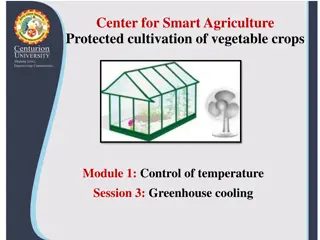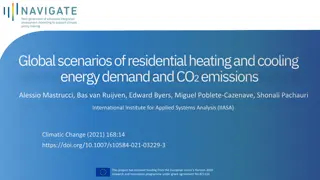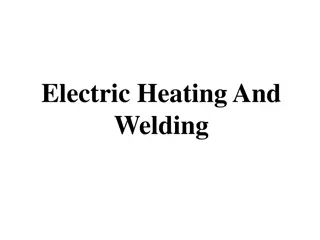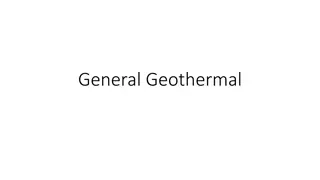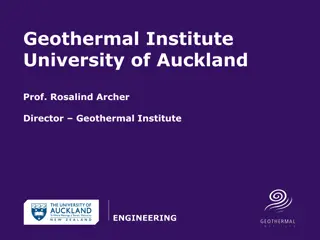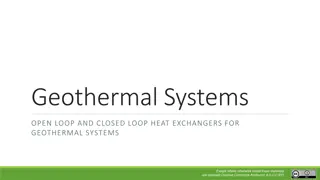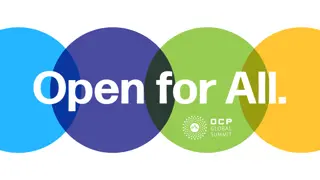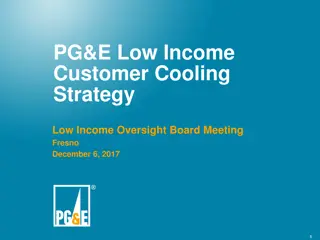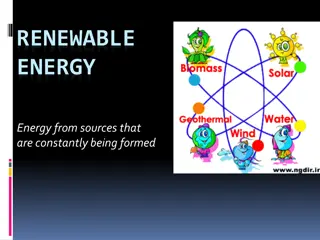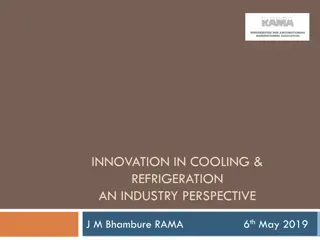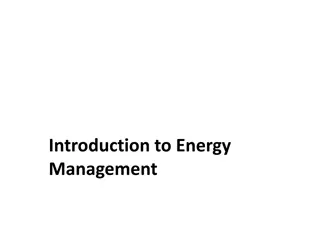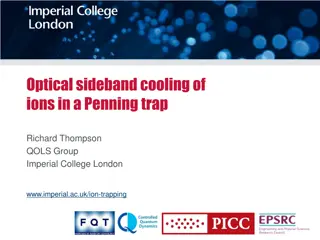Horizon Europe 2021-2027: Geothermal Heating and Cooling Opportunities
Horizon Europe is a 100 billion euro research and innovation funding programme aimed at strengthening the EU's scientific and technological capabilities to enhance innovation, competitiveness, and job creation. The program comprises three pillars focusing on Open Science, Global Challenges, Industrial Competitiveness, and Open Innovation. Additionally, it introduces Research and Innovation (R&I) Missions with bold goals and measurable impacts. The European Innovation Council (EIC) will be established to support innovators through bottom-up activities. Suggested themes for missions include Food & Agriculture, Sustainable Land Digitisation, Quantum Computing, Health (specifically Paediatric Cancer), and Clean Europe (Clean Oceans and Clean Cities). The EIC will provide funding and support for breakthrough innovations with scalability.
Download Presentation

Please find below an Image/Link to download the presentation.
The content on the website is provided AS IS for your information and personal use only. It may not be sold, licensed, or shared on other websites without obtaining consent from the author.If you encounter any issues during the download, it is possible that the publisher has removed the file from their server.
You are allowed to download the files provided on this website for personal or commercial use, subject to the condition that they are used lawfully. All files are the property of their respective owners.
The content on the website is provided AS IS for your information and personal use only. It may not be sold, licensed, or shared on other websites without obtaining consent from the author.
E N D
Presentation Transcript
Horizon Europe (2021-2027): Opportunities for geothermal Heating and Cooling
Horizon Europe is the Commission proposal for a 100 billion research and innovation funding programme for seven years (2021-2027) to strengthen the EU's scientific and technological bases to boost Europe's innovation capacity, competitiveness and jobs to deliver on citizens' priorities and sustain our socio-economic model and values
Horizon Europe: three-pillars The first pillar on Open Science will ensure continuity with H2020 in supporting science within a bottom-up approach through the European Research Council, Marie Sk odowska-Curie Actions and research infrastructures The second pillar on Global Challenges and Industrial Competitiveness will follow a more top down approach. With calls, a set of highly visible missions will be introduced. Missions, with ambitious but time-bound and achievable goals, should speak to the public and engage it. They will be designed with MS, the EP, stakeholders and citizens The third pillar on Open Innovation will focus on innovation by establishing a European Innovation Council (EIC) and continued support to the European Institute of Innovation and Technology (EIT). The EIC will offer a one-stopshop to innovators. Activities will be mainlybottom-up.
Whats New I A mission will consist of a portfolio of actions intended to achieve a bold and inspirational as well as measurablegoal within a set timeframe, with impact for science and technology, society and citizens that goes beyond individual actions. R&I Missions Horizon Europe proposal defines mission characteristics and criteria. Specific missions will be co-designed with Member States, stakeholders and citizens and programmed within the Global Challenges and Industrial Competitiveness pillar (drawing on inputs from other pillars).
Suggested Themes for HE Missions: Food & Agriculture:Sustainable Land Digitisation: Quantum Computing Health: Paediatric Cancer Clean Europe: Clean Oceans / Clean cities
Whats New II The EIC will support innovations with breakthrough and disruptive nature and scale up potential that are too risky for private investors. European Innovation Council Two complementary instruments bridging the gap from idea to investable project Accelerator: Pathfinder: grants (from early technology to pre- commercial) grants & blended finance (from pre-commercial to market & scale-up)
Budget: 100 billion* billion 2.4 2.1 In current prices Open Science 13.5 25.8 Global Challenges & Ind. Competitiveness Open Innovation Strengthening ERA 52.7 Euratom * This envelope includes EUR 3.5 billion allocated under the InvestEU Fund.
Pillar II: Global Challenges Budget (billion EUR) Clusters Implemented through calls, missions & partnerships Health 7.7 Inclusive and Secure Societies 2.8 Digital and Industry 15 Climate, Energy and Mobility 15 Food and Natural Resources 10 2.2 Joint Research Centre supports European policies with independent scientific evidence & technical support throughout the policy cycle
Cluster Climate, Energy and Mobility Areas of intervention: Climate science and solutions; Energy supply; Energy systems and grids; Buildings and industrial facilities in energy transition; Communities and cities; Industrial competitiveness in transport; Clean transport and mobility; Smart mobility; Energy storage Tackling climate change: 35% budgetary target
Key features (I) Time to grant: for informing all applicants of the outcome of the evaluation of their application, a maximum period of five months from the final date for submission of complete proposals; for signing grant agreements with applicants, a maximum period of eight months from the final date for submission of complete proposals Certificate on financial statements: it shall be mandatory at payment of the balance, if the amount claimed is equal to or greater than EUR 325 000 Increased use of simplified forms of grants where appropriate (building on the H2020 lump sum pilot experience)
Key features (II) Indirect costs: They shall be determined by applying a flat rate of 25% of the total direct eligible costs, excluding direct eligible costs for subcontracting, financial support to third parties and any unit costs or lump sums which include indirect costs. However, if provided for in the work programme, indirect costs may be declared in the form of a lump sum or unit costs Mutual insurance mechanism: Beneficiaries shall make a contribution of 5% of the Union funding for the action. On the basis of periodic evaluations, this contribution may be raised by the Commission up to 8% or may be reduced under 5%. The contribution of the beneficiaries shall be returned at the payment of the balance
Key features (III) Financial capacity: It shall be verified only for the coordinator and only if the requested funding from the Union for the action is equal to or greater than EUR 500 000. Evaluation of proposals: on the basis of the following award criteria: (a) excellence; (b) impact; (c) qualityand efficiency of the implementation Reimbursement rates: the Programme may reimburse up to 100 % of total eligible costs of an action except for: o (a) innovation actions: up to 70% of the total eligible costs, except for non-profit legal entities where the Programme may reimburse up to 100 % of the total eligible costs; o (b) programme co-fund actions: at least 30% of the total eligible costs, and in identified and duly justified cases up to 70%.
Timeline Parliament and Council negotiations on Union budget 2021-2027, including budget for Horizon Europe Ongoing Parliament and Council negotiations on the basis of the Commission proposal for Horizon Europe Ongoing Strategic planning to prepare first work programmes under Horizon Europe, including co- design of missions and setting up of partnerships 2nd half 2019 1 January 2021 Envisaged start of Horizon Europe
